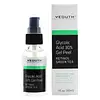What's inside
What's inside
 Key Ingredients
Key Ingredients

 Benefits
Benefits

 Concerns
Concerns

 Ingredients Side-by-side
Ingredients Side-by-side

Water
Skin ConditioningGlycolic Acid
BufferingOctoxynol-10
EmulsifyingPhenoxyethanol
PreservativeHydroxyethylcellulose
Emulsion StabilisingGlycerin
HumectantPropylene Glycol
HumectantCucumis Sativus Fruit Extract
EmollientCamellia Sinensis Flower Extract
PerfumingChamomilla Recutita Flower Extract
MaskingSodium Hydroxide
BufferingRetinyl Palmitate
Skin ConditioningSymphytum Officinale Leaf Extract
Skin ConditioningWater
Skin ConditioningGlycerin
HumectantPropylene Glycol
HumectantPolysorbate 80
EmulsifyingPhenoxyethanol
PreservativeSodium Benzoate
MaskingSodium Hyaluronate
HumectantHydroxyethylcellulose
Emulsion StabilisingDisodium EDTA
Olea Europaea Leaf Extract
PerfumingParfum
MaskingBenzophenone-4
UV AbsorberButylene Glycol
HumectantCitrus Grandis Extract
AntimicrobialCucumis Sativus Fruit Extract
EmollientBenzyl Benzoate
AntimicrobialCI 19140
Cosmetic ColorantThymus Vulgaris Flower/Leaf Extract
MaskingEucalyptus Globulus Leaf Oil
PerfumingBenzyl Alcohol
PerfumingAlpha-Isomethyl Ionone
PerfumingCI 42090
Cosmetic ColorantLinalool
PerfumingCitronellol
PerfumingMorus Alba Root Extract
BleachingWater, Glycerin, Propylene Glycol, Polysorbate 80, Phenoxyethanol, Sodium Benzoate, Sodium Hyaluronate, Hydroxyethylcellulose, Disodium EDTA, Olea Europaea Leaf Extract, Parfum, Benzophenone-4, Butylene Glycol, Citrus Grandis Extract, Cucumis Sativus Fruit Extract, Benzyl Benzoate, CI 19140, Thymus Vulgaris Flower/Leaf Extract, Eucalyptus Globulus Leaf Oil, Benzyl Alcohol, Alpha-Isomethyl Ionone, CI 42090, Linalool, Citronellol, Morus Alba Root Extract
 Reviews
Reviews

Ingredients Explained
These ingredients are found in both products.
Ingredients higher up in an ingredient list are typically present in a larger amount.
This extract comes from cucumber. Cucumbers are mostly made up of water (95%), and the other 5% is composed of: vitamin C, caffeic acid, fatty acids, amino acids, and other minerals.
Cucumbers have anti-inflammatory, barrier repair, and hydrating properties.
They contain shikimate dehydrigenase, an enzyme shown to help reduce inflammation and soothe the skin.
The amino acids found in cucumbers help nourish our skin's natural acid mantle (it's an important part of our skin barrier). This slightly acidic film acts as a barrier to protect us from bacteria, viruses, and other contaminants.
Unless you have an allergy to cucumbers, this is generally a non-irritating ingredient.
Fun fact: Cucumis Sativus is native to South Asia and can now be found on every continent.
Learn more about Cucumis Sativus Fruit ExtractGlycerin is already naturally found in your skin. It helps moisturize and protect your skin.
A study from 2016 found glycerin to be more effective as a humectant than AHAs and hyaluronic acid.
As a humectant, it helps the skin stay hydrated by pulling moisture to your skin. The low molecular weight of glycerin allows it to pull moisture into the deeper layers of your skin.
Hydrated skin improves your skin barrier; Your skin barrier helps protect against irritants and bacteria.
Glycerin has also been found to have antimicrobial and antiviral properties. Due to these properties, glycerin is often used in wound and burn treatments.
In cosmetics, glycerin is usually derived from plants such as soybean or palm. However, it can also be sourced from animals, such as tallow or animal fat.
This ingredient is organic, colorless, odorless, and non-toxic.
Glycerin is the name for this ingredient in American English. British English uses Glycerol/Glycerine.
Learn more about GlycerinHydroxyethylcellulose is used to improve the texture of products. It is created from a chemical reaction involving ethylene oxide and alkali-cellulose. Cellulose is a sugar found in plant cell walls and help give plants structure.
This ingredient helps stabilize products by preventing ingredients from separating. It can also help thicken the texture of a product.
This ingredient can also be found in pill medicines to help our bodies digest other ingredients.
Learn more about HydroxyethylcellulosePhenoxyethanol is a preservative that has germicide, antimicrobial, and aromatic properties. Studies show that phenoxyethanol can prevent microbial growth. By itself, it has a scent that is similar to that of a rose.
It's often used in formulations along with Caprylyl Glycol to preserve the shelf life of products.
Propylene Glycol is an odorless, colorless liquid. As a humectant, it helps skin retain moisture. It also aids in delivering active ingredients.
Another role of this ingredient is preventing a product from melting or freezing. Propylene glycol also adds antimicrobrial properties to a product, elongating product lifespan.
This ingredient is considered an organic alcohol and commonly added into both cosmetics and foods.
Those with sensitive skin or conditions may develop a rash when using this ingredient.
Learn more about Propylene GlycolWater. It's the most common cosmetic ingredient of all. You'll usually see it at the top of ingredient lists, meaning that it makes up the largest part of the product.
So why is it so popular? Water most often acts as a solvent - this means that it helps dissolve other ingredients into the formulation.
You'll also recognize water as that liquid we all need to stay alive. If you see this, drink a glass of water. Stay hydrated!
Learn more about Water